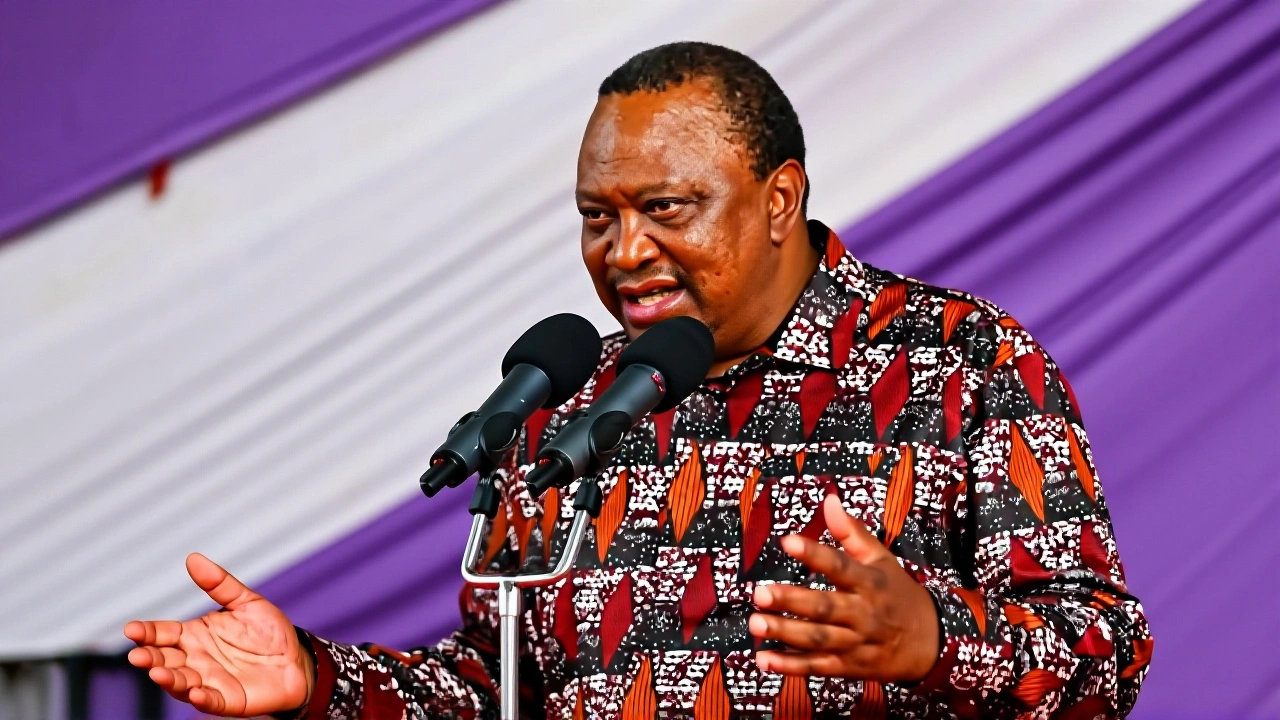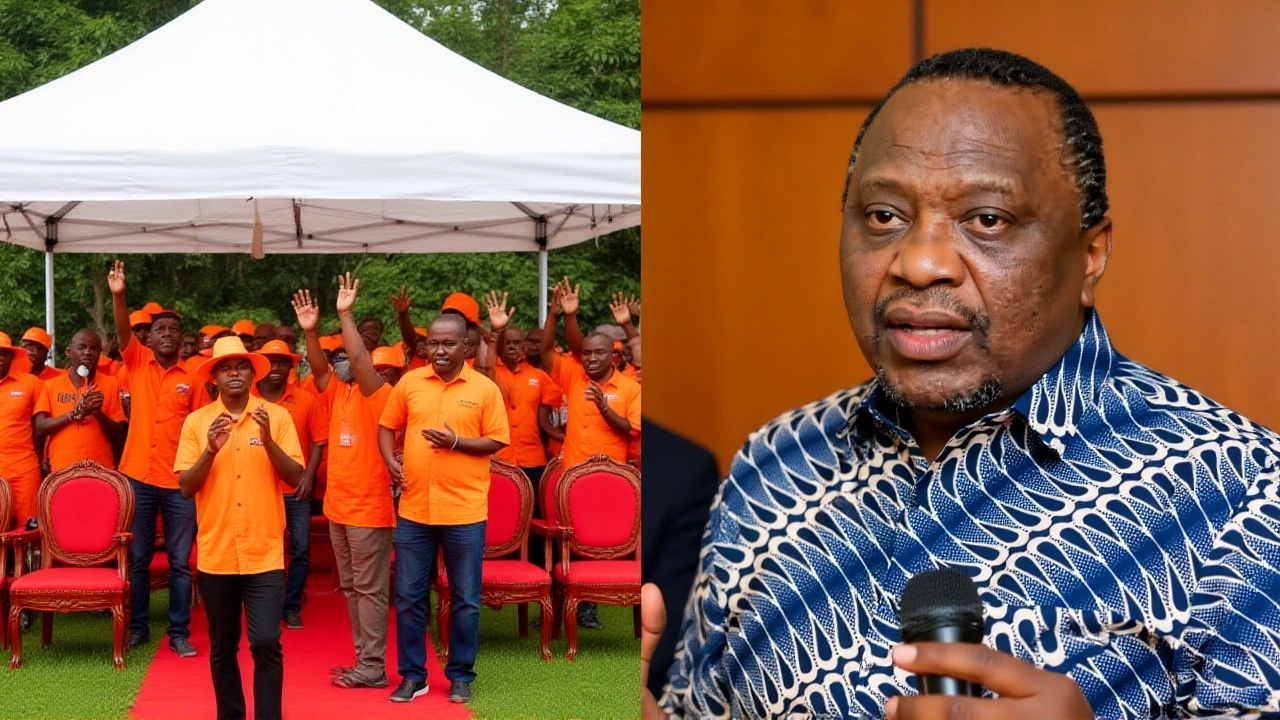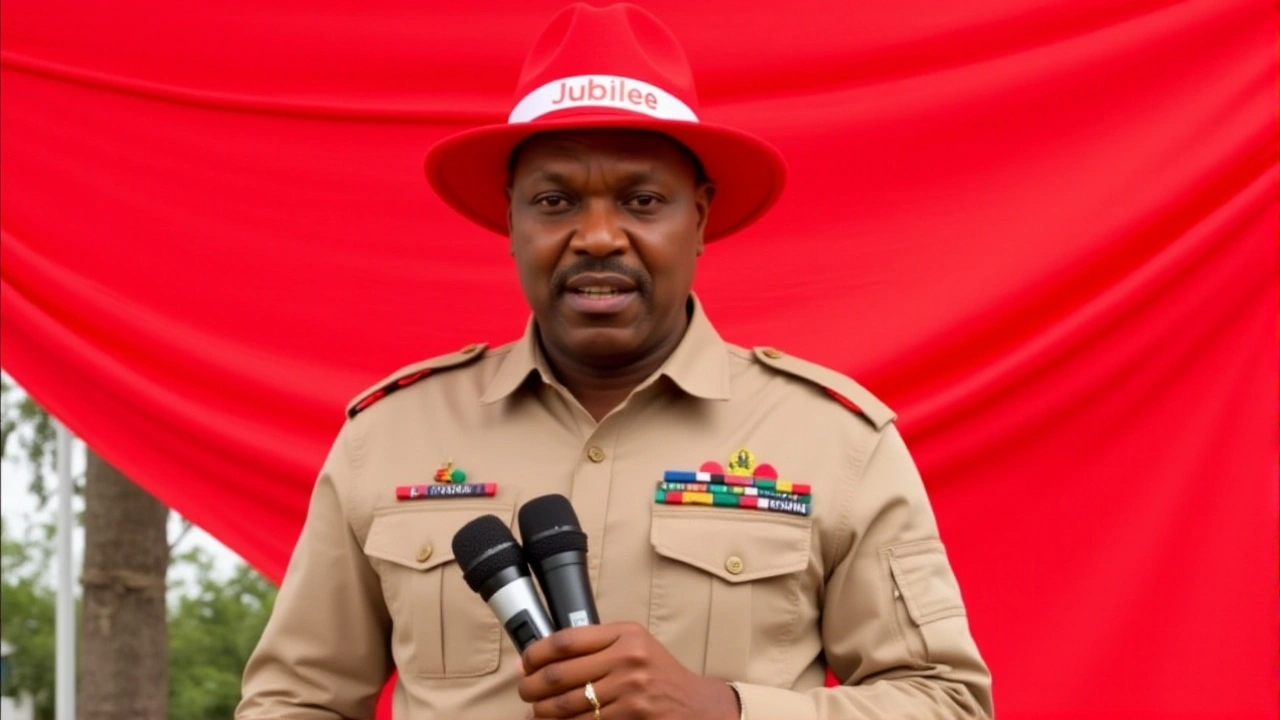 Nov, 17 2025
Nov, 17 2025
Former President Uhuru Kenyatta didn’t mince words when he stood before the Jubilee Party National Delegates Conference in Nairobi in 2023. "Today, many of the gains of the past have been eroded," he declared. "Linda Mama and others have been replaced by new, untried and untested schemes. While we wait for these experiments to work, Kenyans suffer and our progress is dragged." The statement wasn’t just policy criticism—it was a political grenade thrown into the heart of the Kenya Kwanza coalition’s first year in power. And it landed with a bang.
The Collapse of UhuRuto
For years, the political world in Kenya operated under a strange truce: the UhuRuto handshake. After the bitter 2017 election, Uhuru Kenyatta and William Samoei Ruto, once sworn enemies, embraced on March 9, 2018. It was a deal stitched together by power, not principle. Their alliance carried Ruto to the presidency in August 2022, with Kenyatta’s endorsement seen as crucial. But now? The handshake is dust. The truce is over. What remains is open warfare.What Was Lost: The Linda Mama Program
Kenyatta’s most visceral attack centered on the termination of the Linda Mama program, a maternal healthcare initiative launched in 2013 that covered over 1.5 million expectant mothers annually. It wasn’t perfect—there were delays in reimbursements and uneven access—but it was real. Women delivered babies without fear of hospital bills. When Kenya Kwanza scrapped it in 2023, replacing it with a patchwork of pilot programs, mothers felt it. Now, Kenyatta is making that pain political. "You replaced a system that worked with experiments," he said. "And Kenyans are paying the price." The Kenya Kwanza government argues the program was unsustainable, costing over KES 10 billion annually. But critics point out that the replacement—still in pilot form—has reached fewer than 200,000 women nationwide. The gap isn’t just fiscal. It’s human.Ruto’s Lieutenants Fire Back
On the same Friday, in Kitui town, Vincent Kawaya, MP for Mwala and National Organizing Secretary of the United Democratic Alliance (UDA), responded with fire. "Uhuru Kenyatta should retire honourably and stop lecturing those who are fixing the mess he left behind," he told a crowd of boda boda riders. The crowd roared. Kawaya didn’t stop there. He called the Nairobi Expressway—a 27-kilometer toll road completed in May 2022 at a cost of KES 32.9 billion—an "exploitative project benefiting Uhuru’s associates." No names were named. No evidence presented. Just accusation, amplified. Dr. Rachael Nyamai, MP for Kitui South, echoed Kawaya’s sentiment, though without direct quotes. Her silence spoke volumes. The message from Kenya Kwanza’s base is clear: they believe Kenyatta’s era was one of elite enrichment, and Ruto’s is one of populist redemption. The narrative is being weaponized.
The Numbers Behind the Noise
Both sides are using economic data like weapons. Kenya’s public debt-to-GDP ratio sits at 70.4%, a figure Kenya Kwanza blames squarely on Kenyatta’s watch. But here’s the twist: that debt climbed from 55% in 2013 to 70.4% in 2022. Growth happened under Kenyatta, but so did borrowing. Now, inflation is at 6.7% as of June 2023. Fuel subsidies are eating up KES 15 billion every month. The fiscal deficit for 2022/2023 was 6.7% of GDP. Neither side owns the problem. Both are trying to own the blame. Kenyatta argues that his administration built infrastructure—roads, railways, hospitals—that Ruto is now dismantling. Ruto’s team says those were vanity projects, financed by debt, that didn’t reach the poor. The Nairobi Expressway is the perfect symbol: a gleaming, modern road that costs drivers KES 150 to use. To some, it’s progress. To others, it’s a toll on the people.What’s Next: The Road to 2027
The Jubilee Party is now reorganizing for the 2027 elections—scheduled for Tuesday, August 10, 2027. Kenyatta’s speech wasn’t just criticism. It was a rallying cry. He’s rebuilding his base, reminding loyalists of what they lost. Meanwhile, William Ruto is doubling down on his Bottom-Up Economic Transformation Agenda (BETA), targeting small traders, farmers, and youth with cash grants and training. It’s a grassroots strategy, and so far, it’s working in rural strongholds. But here’s the real question: when Kenyans look at their grocery bills, their fuel prices, and their hospital queues, who do they blame? The man who built the roads but left the debt? Or the man who promised relief but hasn’t delivered enough? The political theater is getting louder. The stakes? The next decade of Kenya’s future.
Background: The Handshake That Changed Kenya
The UhuRuto handshake didn’t just end a rivalry—it rewrote Kenya’s political playbook. After the disputed 2017 election, which led to a Supreme Court annulment and a repeat vote, Kenyatta and Ruto—once bitter rivals—met in a Nairobi hotel and shook hands. It was a moment of pure political pragmatism. Kenyatta needed to neutralize Ruto’s challenge. Ruto needed access to state power. Their alliance won the 2022 election. But alliances built on convenience rarely survive betrayal. And in politics, the greatest betrayal is when your ally becomes your accuser.What the Experts Say
Dr. Amina Mwangi, a political economist at the University of Nairobi, put it bluntly: "This isn’t about policy anymore. It’s about legacy. Kenyatta is fighting to be remembered as a builder. Ruto is fighting to be remembered as a reformer. Both are terrified of being forgotten." The public, meanwhile, is caught in the middle. And they’re tired.Frequently Asked Questions
Why did Uhuru Kenyatta target the Linda Mama program specifically?
Linda Mama covered over 1.5 million pregnant women annually, making it one of Kenya’s most widely used public health programs. Its termination in 2023 left a gap no replacement has filled—only 200,000 women are now reached under pilot schemes. For Kenyatta, it’s not just policy—it’s personal. He championed it as a signature achievement of his presidency, and its removal symbolizes what he sees as Ruto’s reckless dismantling of proven systems.
Is the Nairobi Expressway really benefiting Uhuru Kenyatta’s associates?
Vincent Kawaya made that claim, but no names, contracts, or financial records have been publicly released to support it. The expressway was built by a consortium led by China Road and Bridge Corporation, with financing from Chinese banks. While critics argue tolls are high and accessibility limited, allegations of personal enrichment remain unproven. Still, the perception matters—many Kenyans believe major infrastructure projects favor political elites.
How did the UhuRuto alliance fall apart so quickly?
The alliance was always fragile—built on electoral necessity, not shared ideology. Once Ruto won the presidency, the power dynamic shifted. Kenyatta expected influence; Ruto wanted autonomy. When Kenya Kwanza began reversing key Jubilee policies like Linda Mama and criticizing infrastructure projects, Kenyatta saw it as betrayal. The 2023 conference was his public declaration: the deal is dead.
What’s at stake for ordinary Kenyans in this feud?
Everything. With inflation at 6.7% and fuel subsidies draining KES 15 billion monthly, social programs are under pressure. As politicians battle over legacy, basic services—healthcare, transport, food security—are being used as political ammunition. The real losers are the 1.5 million women who lost maternal care, the boda boda riders struggling with rising fuel prices, and the small business owners caught in the crossfire of policy reversals.
Can William Ruto win re-election in 2027?
Possibly. His BETA program has built strong grassroots support in rural areas, and his administration has made progress on youth employment and digital ID systems. But if inflation remains above 6%, if healthcare access declines further, and if the public perceives corruption in infrastructure deals, his support could erode. The 2027 election will hinge not on past achievements, but on whether Kenyans feel their daily lives have improved since 2022.
What role does the Jubilee Party play now?
Once the dominant force in Kenyan politics, Jubilee is now the main opposition bloc preparing for 2027. Its strength lies in its organizational network and loyalty among older voters and civil servants. But without a clear presidential candidate yet, it’s struggling to define its identity. Kenyatta’s speech was an attempt to reassert leadership, but the party’s future depends on whether it can unite behind a new figure before the next election cycle.

रमेश कुमार सिंह
November 19, 2025 AT 01:30It's wild how politics turns human suffering into a chess game. Linda Mama wasn't just a program-it was hope wrapped in a hospital bracelet. When you take that away, you're not cutting budgets, you're cutting breath from mothers who just want to survive childbirth without selling their last goat. And now? We're debating toll roads like they're poetry. The real tragedy isn't the debt-it's that we've forgotten what 'public service' even means anymore.
Krishna A
November 19, 2025 AT 04:19Uhuru just mad cause Ruto got the crown. Classic.
Jaya Savannah
November 19, 2025 AT 14:59So... the handshake died and now we got political soap opera? 🤦♀️ At least the Nairobi Expressway looks nice at night. But yeah, 150 shillings just to get to work? Oof. #KenyansJustWantToBreathe
Sandhya Agrawal
November 20, 2025 AT 23:21They’re all lying. The Chinese built the expressway but the money went to a shell company in the Caymans linked to Uhuru’s cousin’s ex-wife’s dog walker. I’ve seen the documents. No one talks about this because they’re scared. They’re all in on it. Even the boda boda riders are paid to stay quiet.
Vikas Yadav
November 22, 2025 AT 00:45Let’s be clear: infrastructure investment isn’t vanity-it’s legacy. Roads, hospitals, maternal care-they’re not political trophies, they’re lifelines. And when you dismantle them, you don’t just break systems-you break trust. And trust? It’s harder to rebuild than any highway.
Amar Yasser
November 22, 2025 AT 04:26I know it’s messy, but I still believe in change. Ruto’s BETA might be rough around the edges, but at least someone’s trying to get money into the hands of people who need it-not just the big shots in Nairobi. Maybe we don’t have perfect solutions yet, but at least we’re moving forward. Slowly. Messily. But forward.
Steven Gill
November 22, 2025 AT 18:28It’s sad how we’ve turned care into a political weapon. A mother doesn’t care who built the road or who cut the program. She just wants to hold her baby without crying over a bill. Maybe we’re all just tired of being used as voting blocks instead of being treated like humans. I miss when politics felt like it was for us, not against us.
Saurabh Shrivastav
November 24, 2025 AT 12:17Oh wow, Uhuru’s crying about ‘untested experiments’? Bro, he had 10 years to fix the economy and left it on fire. Now he’s mad because Ruto’s trying to put out the flames with a squirt gun? Classic elite guilt. The only experiment here is whether Kenyans will keep believing in politicians who talk like philosophers but act like accountants.
Prince Chukwu
November 26, 2025 AT 10:37Man, this whole thing feels like a Kenyan Shakespeare play-tragedy with boda boda riders and maternal health as the chorus. Uhuru’s the old king, Ruto’s the rebellious prince, and the people? They’re the fools who still believe the crown will bring bread. I’ve seen villages where women walk 10km to give birth because the clinic ran out of gloves. No one’s filming that for TikTok. But that’s the real drama.
Divya Johari
November 27, 2025 AT 14:48It is an undeniable fact that the erosion of institutional integrity under the previous administration has precipitated a crisis of fiscal responsibility. The replacement of evidence-based policy with populist novelties is not merely regrettable-it is an affront to governance itself.
Aniket sharma
November 28, 2025 AT 07:55Hey everyone, just chill for a sec. Both sides have points. Uhuru built things, Ruto’s trying to fix what broke. But we’re all tired of being pitted against each other. Maybe we need a third way-not ‘Uhuru or Ruto’ but ‘Kenya first’. What if we started demanding leaders who listen instead of lecture?
Unnati Chaudhary
November 29, 2025 AT 03:08I used to get my prenatal checkups through Linda Mama. No stress, no begging, no hiding receipts. Now I pay out of pocket and pray I don’t get a surprise bill. It’s not politics-it’s survival. And honestly? I don’t care who’s right. I just want my baby to be safe. That’s all.
Sreeanta Chakraborty
December 1, 2025 AT 01:32Foreigners own everything. The roads, the hospitals, the healthcare programs. Even the handshake was a foreign plot to destabilize our sovereignty. The UhuRuto alliance was a trap. Now they’re trying to make us believe the problem is internal. But we know the truth. They’re stealing our future, one toll booth at a time.
Vijendra Tripathi
December 2, 2025 AT 15:43Look, I’m not here to pick sides. But I’ve seen both sides. I worked in a clinic when Linda Mama ran. I’ve seen moms cry because they couldn’t afford stitches. Now I see youth getting BETA grants and finally starting small businesses. It’s not perfect, but it’s real. Progress isn’t a straight line-it’s a messy, bumpy road. But it’s still a road. Keep going.
ankit singh
December 4, 2025 AT 02:30Debt was 55% in 2013, now it's 70%. Inflation at 6.7%. Fuel subsidies = 15B/month. Linda Mama cost 10B. Replacement reaches 200K vs 1.5M. Nairobi Expressway = 32.9B. All numbers are public. Stop yelling. Start comparing. The truth is somewhere in the spreadsheet.